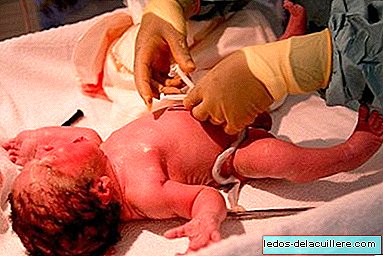
For some years it has been discovered that delaying the cutting of the umbilical cord has several benefits for the baby, both short and long term.
A new study adds another benefit to the list, since infants who had a late cut in the umbilical cord had a lower chance of suffering from anemia. According to this study in Nepal, wait at least three minutes before ligating the umbilical cord after birth, provide extra iron to babies, which is reflected in a lower risk of anemia during the first year of life.
Children with iron deficiency and anemia may have a deterioration in the development of their nervous system, which affects their cognitive and motor skills, as well as their behavior. These children are usually given a special diet with foods and supplements that provide extra iron, but some previous studies have suggested that late cutting of the umbilical cord may reduce the chances of iron deficiency by giving babies a transfusion of iron-rich blood from the placenta.
For the study, 540 babies were examined, of which it was randomly chosen that some be cut after three minutes and others were made within the first minute after birth. Eight months later, babies who had late umbilical cord clamping were shown to have a 11% less likely to suffer from anemiaas well as a 42% less likely to have an iron deficiency, compared to babies who had the cord cut almost immediately.
Dr. Ola Andersson, one of the scientists who participated in the study stated that "If a baby has an immediate cut of the umbilical cord, he does not have access to a part of his own blood that still remains in the placenta. That extra blood could have protected him from having anemia and iron deficiency during his first year of life".
Currently the World Health Organization recommends waiting at least one minute to perform cord clamping, so Dr. Andersson comments that the guidelines for doing so should be adjusted within three minutes so that more babies have a late cut in the umbilical cord.
A limitation of this study was that only 400 babies of the 540 who originally participated in the study returned to follow up at 8 months. Within these 400 babies, 73% of babies who had late impingement had anemia, while 82% of those who did not wait to perform the cut presented anemia.
For the 12-month review, only 344 babies attended, and anemia continued to feel less common in the group of babies with late umbilical cutting. Despite these limitations, this study proved that if there is a relationship the late cut with less likely to suffer anemia.
"The main message of this study is that the delay of at least 3 minutes in the cutting of the umbilical cord increases iron storage in newborns, can protect against anemia in communities where iron deficiency is common and has been previously demonstrated which has favorable effects on development at 4 years of age in well-fed populations", Dr. Andersson said.












